Activity Report: Area & Country >> India
New Delhi, India (November 4, 2016)
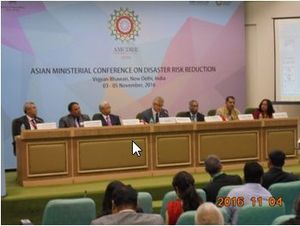 The International Recovery Platform, where ADRC is pioneering member, coordinated a thematic session at the Asian Ministerial Conference on Disaster Risk Reduction, 3-5 November 2016 in New Delhi, India. The session was entitled "Strategies and Actions on Build Back Better" held on 4 November 2016, 13:00-14:30, Hall 6 at Vigyan Bhawan. Six high-level speakers of the session shared their respective experiences and lessons relative to: (i) policies and strategies, (ii) institutional arrangements, (iii) financing mechanisms, and (iv) implementation arrangements and recovery management - the key elements relevant to build back better. About 150 individuals participated in the session, where each speaker outlined key strategies and actions for build back better ranging from the areas of governance, gender, pre-investment, social inclusion, and sustainable development.
The International Recovery Platform, where ADRC is pioneering member, coordinated a thematic session at the Asian Ministerial Conference on Disaster Risk Reduction, 3-5 November 2016 in New Delhi, India. The session was entitled "Strategies and Actions on Build Back Better" held on 4 November 2016, 13:00-14:30, Hall 6 at Vigyan Bhawan. Six high-level speakers of the session shared their respective experiences and lessons relative to: (i) policies and strategies, (ii) institutional arrangements, (iii) financing mechanisms, and (iv) implementation arrangements and recovery management - the key elements relevant to build back better. About 150 individuals participated in the session, where each speaker outlined key strategies and actions for build back better ranging from the areas of governance, gender, pre-investment, social inclusion, and sustainable development.
H.E. Vongthep Arthakaivalvatee, Deputy Secretary-General ASEAN Secretariat, reported that ASEAN is setting forward a regional policy on build back better based on the recovery and reconstruction component of the ASEAN Agreement on Disaster Management and Emergency Response (AADMER). The regional policy sets forth the process and the timeframe for assessment, recovery plan formulation, resource mobilization, coordination, and transition of recovery plan to development plan so that member states are guided. With the AADMER in place, member states are about to improve safer structural and non-structural measures during reconstruction. Other specific examples of regional efforts include Tripartite Core Group partnership in recovery from cyclone Nargis in Myanmar as well as development of guides such as the Recovery Toolbox and the Disaster Recovery Reference Guide.
Mr. Sushil Gyewali, Chief Operating Officer of National Reconstruction Authority of Nepal, shared the key challenges of the Post-Disaster Recovery Framework 2016-2020. In terms of policies, the challenges include managing political interests, community expectations, compliance to build back better principle, and operations of the new National Reconstruction Authority that adopts a new perspective but with old team. In terms of institutional arrangement, the challenges are institution building against the pressure of delivery as well as the capacity to deliver reconstruction that complements national resources with international expertise. In terms of financing mechanism, the challenges include ensuring international commitment, financing, and realistic recovery planning and implementation. In terms of recovery management, a robust and decentralized reconstruction coordination and implementation mechanism was designed and instituted as well as engaging community.
Mr. Austere Panadero, Undersecretary at the Department of the Interior and Local Government of the Philippines, highlighted the key initiatives that help address the gaps in DRR and recovery efforts. In terms of policies, land use plan is the 'mother' of all plans and the basis for 'build back better' at the local/community level. Additionally, hazard-proofing of public investments is advocated through planning-programming-budgeting linkages as well as better DRRM-CCA informed criteria for project development and evaluation. In terms of institutional arrangements, the barangay-level or village-level DRRM-CCA baseline information is being generated locally and communities are strengthened through capacity building activities down to the household levels. In terms of financing mechanisms, initiatives such as Climate Change Expenditure Tagging (CCET) and the Seal of Good Local Governance through disaster preparedness audits are put in place. Finally, in terms of recovery management, a seamlessness of local development plans such as those drawn from Typhoon Haiyan experience in the Visayas and the "whole-of-government" approach under NDRRMC-OCD are among the many examples of tried and tested implementation arrangements.
Prof. Vinod Menon, Senior Advisor Caritas India, pointed that community-centered policies are essential. He introduced the "Community-Centered Risk Management" Framework for build back better, emphasizing inclusive recovery with special attention to the weak and marginalized groups. The framework was presented to be one of the solutions to address existing policy gaps as it facilitates: (i) coherence and convergence of policies relative to DRR, CCA, and SDGs; (ii) inclusion of the weaker sections of society as the hallmark of all recovery strategies; and (iii) support for resilience building of communities affected by ethnic conflicts, atrocities against vulnerable sections, violence and complex emergencies.
Mr. Achyut Luitel, Director of Practical Action Nepal, introduced the South Asian Disaster Report 2016, which outlines 12 recommendations for build back better in Nepal, namely: (1) promote multi-tier, multi-stakeholder policy directions; (2) harmonization and standardization of policy, legislative, and regulatory instruments; (3) ensure institutional demarcation for phase-out planning and implementation; (4) holding institutions accountable for addressing DRR in development interventions; (5) focus on vulnerable within vulnerable; (6) enable the potential and capacity of women as decision-makers; (7) make housing reconstruction owner-driven; (8) make schools safe for children; (9) building on local solutions; (10) move from cash transfer to risk transfer; (11) rebuilding micro and small enterprises; and (12) building disaster risk-informed development for resilience.
Ms. Shaila Shahid, Team Leader Gender and Water Alliance Bangladesh, highlighted two policy actions, namely: (i) inclusion/awareness raising, where in the case of Bangladesh, actions such as participation of women in disaster management councils and local government, volunteerism, and representation in the management bodies are promoted; and (ii) capacity building focusing on understanding gender, identifying social relations between men and women, and how these relationships are socially constructed to encourage leadership role.
After active discussions, Mr. Stefan Kohler of UNOPS and chair of the session offered the summary. First, recovery phase is an opportunity to build back better, which is essential to reduce vulnerability and make the development gains more sustainable. It can be more successful of done with inclusion of the weak and marginalized. Second, pre-investment is an important element for build back better to ensure development continuity, such as promoting risk-informed land use planning. Third, awareness, knowledge, and capacity such as in reference to gender and marginalized groups are essential in facilitating effective preparation to build back better in recovery, rehabilitation, and reconstruction Finally, build back better in recovery is a large-scale institutional and technical effort, which requires all the stakeholders--government, civil societies, and private sector --to collaborate and work together such as the whole-of-government approach of the Philippines.
(2016/11/04 14:40)
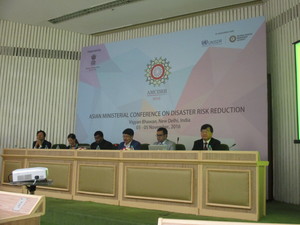 ADRC contributed to the event by the presentation titled "GLIDE, GLobal unique disaster IDEntifier number to Support Evidence Based Disaster Reduction Strategy at National & Local Levels -A Simple but Innovative Tool for Effective Disaster Information Sharing-",delivered by Dr.S. Nishikawa, former Executive Director of ADRC. Mr.Nishikawa raised the extensive potential contribution of GLIDE as basic tool to facilitate disaster information sharing at national and sub-national DRR organisations towards upgrading DRR activities including those against mega disasters beyond national borders. Many questions on the use of GLIDE were raised from the floor and after the event. In addition to the useful comments on GLIDE, AMCDRR provided us throughout the Conference period diverse opportunities of exchange with our counterparts from ADRC member countries, which has facilitated us reshaping GLIDE and redefining other activities more adapted to the future needs of Asia.
ADRC contributed to the event by the presentation titled "GLIDE, GLobal unique disaster IDEntifier number to Support Evidence Based Disaster Reduction Strategy at National & Local Levels -A Simple but Innovative Tool for Effective Disaster Information Sharing-",delivered by Dr.S. Nishikawa, former Executive Director of ADRC. Mr.Nishikawa raised the extensive potential contribution of GLIDE as basic tool to facilitate disaster information sharing at national and sub-national DRR organisations towards upgrading DRR activities including those against mega disasters beyond national borders. Many questions on the use of GLIDE were raised from the floor and after the event. In addition to the useful comments on GLIDE, AMCDRR provided us throughout the Conference period diverse opportunities of exchange with our counterparts from ADRC member countries, which has facilitated us reshaping GLIDE and redefining other activities more adapted to the future needs of Asia. 17-19 November 2015 (New Delhi, India)
ADRC participated in the "Asian Leaders' meeting towards implementation of the Sendai Framework for Disaster Risk Reduction in Asia", and the "2nd ISDR Asia Partnership (IAP) meeting of 2015" , held during 17-19 November 2015, New Delhi, India.
On the first day in the morning, the "Asian Leaders' meeting towards implementation of the SFDRR in Asia", a senior level meeting took place, which was attended many political leaders in Asia.
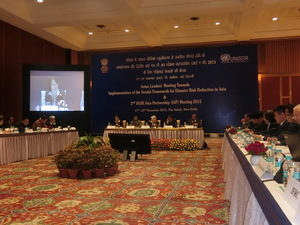 Shri Kiren Rijiju, Hon'ble Union Minister of State for Home Affairs, Government of India opened and set the context of the meeting in his welcome remark, followed by a keynote address by Ms. M. Wahlstrom, UN Special Representative of the Secretary. Senior level representatives from seven countries including AMCDRR host countries in the past and in the future, then delivered their statement on their experience and way forward; People's Republic of China, Republic of Korea, Indonesia, Royal Thai Government, Mongolia, Japan and Afghanistan.
Shri Kiren Rijiju, Hon'ble Union Minister of State for Home Affairs, Government of India opened and set the context of the meeting in his welcome remark, followed by a keynote address by Ms. M. Wahlstrom, UN Special Representative of the Secretary. Senior level representatives from seven countries including AMCDRR host countries in the past and in the future, then delivered their statement on their experience and way forward; People's Republic of China, Republic of Korea, Indonesia, Royal Thai Government, Mongolia, Japan and Afghanistan.Mr. F. Matsumoto, State Minister of Cabinet Office, Government of Japan, hosting the 3rd UN World Conference on Disaster Risk Reduction, expressed their gratitude to the wide participation in the Conference in Sendai and their strong will to support the international community in implementing the SFDRR, in particular, by providing know-how to develop indicators and to strengthen governance. Minister Matsumoto stressed also further collaboration with ADRC and other regional organizations by highlighting the ACDR2016 in Phuket in February 2016. He also encouraged supporting the UN resolution designating the World Tsunami Day by referring to their projects of awareness raising to reduce the damages of Tsunami in Asia. Shri Rajnath Singh, Hon'ble Union Home Minister, India also attended the meeting and expressed his strong hope that the meeting would set the policy directions towards the AMCDRR in 2016.
In the afternoon, the first session of the IAP meeting focused on the AMCDRR in 2016. After the introduction of the agenda by Ms. Kan, Head, UNISDR Asia Pacific office, Ms.Wahlstrom gave her key note, encouraging political commitment to implementing SFDRR in Asia, followed by an update from the host country and presentations by member countries, and those by regional organizations. ADRC reported about its major activities after Sendai and encouraged a wide participation in the ACDR 2016.
Morning session of the second day was focused on the Asian regional plan. A series of presentations to facilitate regional planning was made including those on monitoring of the SFDRR, and indicator. In the afternoon, participants discussed in one of the three groups aiming to provide inputs to develop the Regional Plan. Sector by sector implementation of SFDRR was also spotlighted as well after the coffee break.
The last day started with a panel discussion on local implementation of SFDRR attended by the participants from sub-national governments including Ms. Y. Ito, Vice Mayor of Sendai city, Japan. Three parallel sessions in the afternoon continued to discuss local implementation by focusing on assessment of local risk and resilience, local DRR strategies and plans, and inclusive and community-managed approaches, the outcome of which was shared at the final plenary.
UNDP-India and IRP/ADRC had jointly organized the training on Disaster Recovery Planning, March 28-30, 2012 at UNDP Country Office, New Delhi, India. Twenty eight representatives from different UN and partner organizations in India, who are engaged in long term post disaster recovery, attended the training. Most are from policy and field level that can influence recovery planning. The recently trained officials will act as master trainers who will transfer knowledge to other officials in their respective organizations. The discussions facilitated the sharing of knowledge and experience in recovery planning with the intention to further enhance capacities and enrich the recovery planning process before and after large scale disaster. Additionally, the discussions provided an avenue for participants to analyze different recovery issues and reflect on wide array of options and examples from global experiences. The outputs of the training include sets of recommendations drawn from the group discussions such as market chain analysis for livelihood recovery from possible future disaster in India, which were fine-tuned by the comments from other participants and experts. As way forward, UNDP and other UN organizations in India are exploring to transfer the knowledge on recovery planning to other stakeholders from national agencies down to the village level.
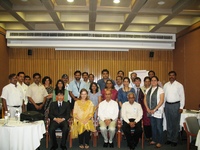
19th and 20th March, 2012 (India, Vanarasi)
International Seminar on "Disaster and
Environmental Management" was held by Institute of
Management Studies, Mahatoma Gandhi Kashi Vidyapith University from 19-20 March
2012 in Vanarasi, India.
The ADRC made a presentation about the
current situation of recovery and reconstruction on Great East Japan Earthquake
and Tsunami in the Technical Session "Institutional and policy Framework for
Disaster Management."
About 100 researchers, experts and students
participated in the seminar and actively exchanged views and opinions on the
issue of disaster and environmental mangement.
(2012/3/21
11:30)
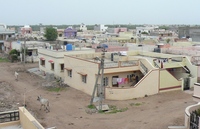 International Recovery Platform (IRP) Secretariat visited Gujarat State, India to survey recovery status on Gujarat Earthquake (Jan. 2001) . The survey includes observing Relocation Sites and collecting fruitful information through meeting with local government officials and NGOs which are implementing recovery programs.
International Recovery Platform (IRP) Secretariat visited Gujarat State, India to survey recovery status on Gujarat Earthquake (Jan. 2001) . The survey includes observing Relocation Sites and collecting fruitful information through meeting with local government officials and NGOs which are implementing recovery programs.Further information about the survey shall be uploaded in the IRP website. (http://www.recoveryplatform.org/)

